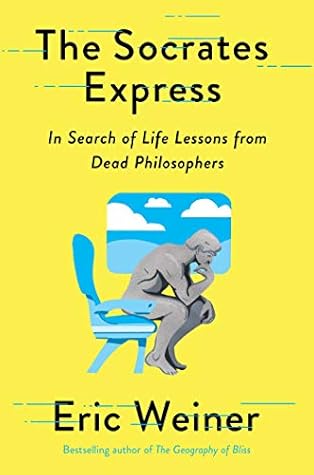More on this book
Community
Kindle Notes & Highlights
by
Eric Weiner
Read between
July 6 - July 7, 2023
You can love something you don’t possess, and never will. It is the pursuit that matters.
Too many of us hum along, cluttering our minds with the trivial and the silly, as if we have all the time in the world. We don’t.
We are at our most vulnerable when we wake, for that is when the memory of who we are, and how we got here, returns.
“It’s the activity that gets you out of bed, not the alarm clock.”
“Our culture has generally tended to solve its problems without experiencing its questions.”
Crazy Wisdom operates on the premise that the path to wisdom is crooked. We must zig before we can zag.
Wonder is personal in a way curiosity is not.
Rather than “Have a good day” or similarly empty expressions, let’s greet each other with “Take your time” or “Slow down.” Utter these imperatives often enough, and we might actually decelerate.
A genuine understanding of a particular virtue leads to virtuous behavior. Automatically.
Respond to adversity, real or imagined, not with self-pity or hand-wringing, but simply by starting over.
That’s the thing about lives of quiet desperation. They’re only quiet on the outside.
Places are special to the extent we make them so.
Shallow is a lack of depth. Superficial is depth diffused. Our portion of the infinite spread thin, but very wide.
“If I am not I, who will be?”
Good art also transcends the passions. Anything that increases desire increases suffering. Anything that reduces desire—reduces willing, as Schopenhauer puts it—alleviates suffering. When we behold a work of art, we are not craving anything.
“You should read only when your own thoughts dry up.” Substitute “click” for “read” and you have our predicament.
“It does not occur to them,” he wrote, “that information is merely a means toward insight and possesses little or no value in itself.”
Political bonds, Epicurus thought, reduced your self-sufficiency, and amounted to outsourcing your happiness. His motto was Lathe Biosas. “Live in obscurity.”
This absurd situation is the one many of us find ourselves in, Epicurus believed. We scoop trivial pleasures atop a mountain of pain, and wonder why we’re not happy.
“It is better for you to lie upon a bed of straw and be free of fear, than to have a golden couch and an opulent table, yet be troubled in mind.”
You cannot double tranquility. You’re either at peace or you are not.
As odd as it may sound, we can reason our way to pleasure, Epicurus taught. If we are unhappy, it is not because we are lazy or flawed. We have simply miscalculated. We have failed to deploy prudence, “sober reasoning,” when appraising pleasure and pain.
ataraxia, the lack of mental disturbance that Epicurus considered the highest good.
nothing is enough for the man to whom enough is too little,”
Attention is not concentration. Concentration can be coerced—listen up, class!—while attention cannot.
Concentration constricts. Attention expands. Concentration tires. Attention rejuvenates. Concentration is focused thinking. Attention is thinking suspended.
Attention is not something we do so much as consent to. Less weight lifting, more yoga. “Negative effort,”
Speed is the enemy of attention.
All inattention is a form of selfishness. We’ve decided that whatever is happening in our heads is more interesting, more important, than what is happening in the rest of the universe.
We lose objects suddenly but experience the loss gradually.
“Given the right nourishment, there is nothing that will not grow, and deprived of it, there is nothing that will not wither away.”
“How can anyone become a thinker if he does not spend at least a third of the day without passions, people and books?”
“Do you suppose that wisdom, the greatest of all skills, can be assembled on a journey? Believe me, there is no journey that could deposit you beyond outbursts of temper, beyond your fears.”
Old age isn’t life’s parody. Life is life’s parody. Old age is simply the punch line.
Absurdity quantified is more, not less absurd.
This, I think, is the final task of old age: not a narrowing of our waters but a widening. Not raging against the dying of the light but trusting that the light lives in others. The wisdom of kairos. Everything has its time. Even this.
Death is not life’s failure but its natural outcome.
Borrowed truths fit about as well as borrowed underwear, and are just as icky. You either know something in your heart or you don’t know it at all.


